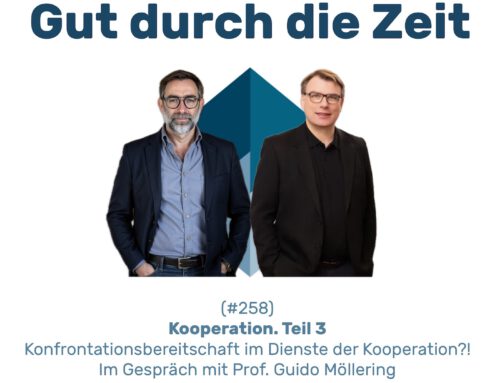INKOVEMA Podcast „Well through time“
#136 – Decisions and their paradoxes.
Why making decisions is an art that should be accompanied by extensive reflection. In conversation with Klaus Eidenschink
Well through time. The podcast about mediation, conflict coaching and organisational consulting.
Klaus Eidenschink: Studied theology, psychology and philosophy, graduate theologian, senior coach and trainer (DBVC), Gestalt therapist (DVG), supervisor, alternative practitioner for psychotherapy (unrestricted healing licence according to § 1 HeilprG), managing director of Eidenschink und Partner and the Hephaistos training institute, whose theoretical basis is the metatheory of change.
Contents:
Looking at the decision-making process sociologicalyou can recognise the Bivalence of decisionsSomething is wanted and something else is not wanted at the same time, something is chosen and something else is deselected. It is also worth noting that expectations are placed on the decision and decision-makers in advance, so that the decision is also a reaction of expectation, which thereby gives meaning to itself. And on top of that, decisions are paradoxical in several respects.
Klaus Eidenschink: Studied theology, psychology and philosophy, graduate theologian, senior coach and trainer (DBVC), Gestalt therapist (DVG), supervisor, alternative practitioner for psychotherapy (unrestricted healing licence according to § 1 HeilprG), managing director of Eidenschink und Partner and the Hephaistos training institute, whose theoretical basis is the metatheory of change.
Deciding is not calculating
Summarising decision as a mental and communicative process that makes a choice between at least two equally valid alternatives, it is no longer a "calculation process". 1+1=2 does not mean that 2 is the result of a decision-making process. If you apply the legal consequence of a rule, you are only making a real decision if the alternative is equivalent!
The consequence of this** radical, counter-intuitive view** is that the Rationality banished from decision-making processes is. The call to make decisions rationally is obsolete because they are no longer real decisions, but "calculation results".
Why this understanding? In cases in which there is rationality, the matter is in fact already decided...However, a result-finding process is not a decision-making process and calculation is in principle not a decision-making process. Learning rationality processes, e.g. applying mathematical or other rules, is generally not a decision-making process.
Advantage of this approach is, ...that the Uncertainty, which is cancelled out by the decision, only becomes visible in this way becomes. Otherwise it is a matter of ignorance. In this way, the responsibility for the decision also becomes clear: because the uncertainty, which is cancelled by the decision, consequently lives on in the decision in favour of A in the good reasons for B as counterarguments! There is no decision without a price! The decision character of the decision can be recognised above all in the good counter-arguments – and thus the degree of responsibility to be borne. This means (sociologically): Only undecidable questions are ultimately decided. "Real" decisions are only made for questions that have at least two equally valid alternatives. Decisions involve a certain degree of unpredictability, even irrationality (Luhmann, VerwArch 1993, 287).
Paradoxically, because it remains undecidable, the equivalence of the alternatives is not established at the time of the decision itself. And whether the assumption in favour of the one (= decision) and against the other (= calculation result) is itself a decision or a calculation task also remains unanswerable and incalculable at the time it is made – and therefore only decidable as undecidable at all. This idea of undecidable questions is based on the concept of the radical constructivists around H. von Foerster.
Decisions are communicative processes,
who give birth to themselves or otherwise:
After the decision is before the decision.








Leave A Comment